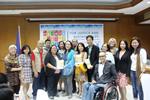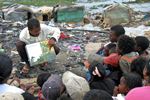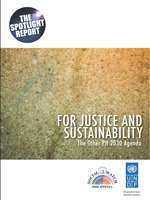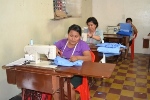Published on Fri, 2016-07-08 18:06
The Philippine economic growth is unjust and not sustainable, as the nation's wealth is concentrated among few billionaires and highly dependent on fossil fuels, according to Social Watch Philippines. "A just and sustainable growth ensures that no one is left behind," Isagani Serrano, SWP co-convenor and Philippine Rural Reconstruction Movement president, said on Friday. The civil society group noted the Philippines can achieve its sustainable development goals by 2030 if the economic growth is not concentrated in the hands of a few billionaires. |
Published on Thu, 2016-07-07 16:23
In all societies, from Northern Europe to South Saharan Africa, there are people that are so isolated, excluded and impoverished that they live in a state of extreme poverty that is passed from one generation to the next. They do not only live in material deprivation but also lack political voice and social capital and for these reasons they are often neglected or overlooked by politicians, service providers and policy-makers. The obstacles that maintain them in poverty are therefore never properly understood nor addressed, with the result that the human rights violations that are the cause and the consequence of their extreme poverty continue unabated, and that the human capital they represent continues to be wasted. |
Published on Fri, 2016-07-01 00:00
“For Justice and Sustainability: The other PH 2030 Agenda” Introduction The Philippines will be free of poverty and will be well on the way to sustainability by 2030. No one will be left behind. That’s the promise, that’s what our government signed up to in 2015. This report, our report, entitled “FOR JUSTICE AND SUSTAINABILITY: The Other PH 2030 Agenda”, is about taking on our government on that promise. It is an attempt by Social Watch Philippines (SWP) to present its view of the stubborn Philippine development dilemma and how it may be overcome. Through this report we offer our support and cooperation in figuring out the sustainability problem and finding lasting solutions to the cyclical problems of high poverty, high inequality and continuing environmental degradation despite or because of economic growth. |
Published on Thu, 2016-06-30 23:15
More than 9 million Afghans (over one third of the population) are not able to meet their basic needs and many more people are highly vulnerable to becoming poor because of the ongoing conflict and heavy reliance on agriculture and international aid as well as the lack of clear pro-poor policies. Women’s participation in the national Parliament (27%) is well above the global average of 21.8 percent, but gender norms in the culture and long walking distances to school in rural areas still prevent many girls to access education and violence against women remains a daunting challenge. The Afghan civil society report acknowledges that the country “has received an unprecedented amount of international development aid over the past 14 years”. This huge aid inflow “has benefited the country, buy it has also brought problems: corruption, fragmented and parallel delivery systems, poor aid effectiveness and weakened governance.” |
Published on Thu, 2016-06-30 23:11
Tax evasion and environmental vulnerability have been identified by Salvadorean civil society as the major obstacles to achieving the SDGs in El Salvador. Tax evasion in 2013 was estimated at $1.5 billion, more than one fourth of total government revenue. At the same time, the annual average of losses due to extreme weather events in the XXI century so far is "equivalent to almost 60 percent of the annual average of its public investment". It is urgent to take a development path that protects Nature from further degradation and strengthens ecosystems to reduce environmental vulnerabilities that mostly affect the poorest sectors of the population. |
SUSCRIBE TO OUR NEWSLETTER







